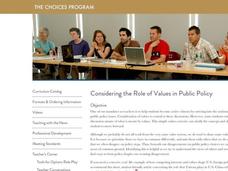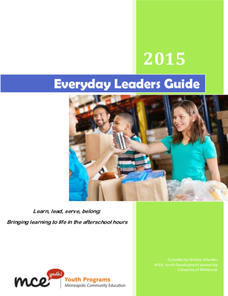University of Florida
Sailing to St. Augustine
Using a Florida map from 1597, young explorers consider the physical characteristics they would need in a site for a new colony and the resources they would need to survive. After selecting a site, class members research to discover the...
Penguin Books
Up Close: Ella Fitzgerald
A reading of Tanya Lee Stones' biography of Ella Fitzgerald lets middle schoolers get up close and personal with the First Lady of Jazz. Stone recounts details of Fitzgerald's life from her early days through her experiences as a teenage...
Syracuse University
Ancient World Writing System
Most twenty-first century pupils don't know how to interpret cuneiform. Examining images of cuneiform and papyrus writing and using a chart and Venn diagram, young historians extrapolate what life may have been like for people who lived...
Syracuse University
World War I
World War I was known for its gruesome battlefields and horrific injuries. Using photographs from a battlefield surgeon's scrapbook, scholars see first-hand what life was like in the trenches. After creating a timeline of the war using...
Stanford University
Lesson Plan: The Children's Crusade and the Role of Youth in the African American Freedom Struggle
Young people played significant roles in the Civil Rights movement. Class members examine the contributions of Barbara Johns, Claudette Colvin, Mary Louise Smith, and the children of Birmingham,...
National Park Service
A Peace Park
Piece together American and Canadian culture by learning about peace parks! Scholars discuss differences between Waterton Lakes National Park and Glacier National Park as a group. The newly-informed pupils answers questions about this...
West Virginia Department of Education
The Debate - John Brown: Martyr or Madman?
Did he die for a cause, or was he crazy? Although the resource discusses John Brown and West Virginia history, many historical figures have the same reputation. Teach learners about different perspectives and highlight the importance of...
West Virginia Department of Education
An Act Worthy of Reward
John Brown is considered by many to be a martyr for abolition and civil rights. The resource covers an important event in West Virginian history, the raid by John Brown, as a standalone that discusses Brown's last words and his reaction...
Just Health Action
Causes of the Causes: What Are the Root Causes of This Problem?
A "Causes of the Causes" diagram enables class members to examine the contributing factors to a problem. After reading a poem that models the process, class members, either in gorps or individually, diagram an issues they are passionate...
Gilder Lehrman Institute of American History
Slave Narratives: Frederick Douglass, Harriet Jacobs, and the Columbian Orator
Young historians practice in-depth, quality analysis of primary source texts in this three-lesson unit, which examines excerpts from the slave narratives of Frederick Douglass, Harriet Jacobs, and Caleb Bingham.
C-SPAN
Polling and Public Opinion
Most people are eager to offer their opinions about topics of interest, but what's the most effective way to collect and assess these opinions as a matter of fact? High schoolers learn about the history of polling, as well as the...
Brown University
Considering the Role of Values in Public Policy
Strong opinions come from deeply held values. Young citizens explore the values that are most important to them in a class discussion and activity. As they prioritize a list of values cards that include freedom, justice, and democracy,...
Population Connection
Meeting Human Needs
How to meet the needs of people around the globe—a question many ask. The fifth in a six-part series about human population and its effects on the globe, the eye-opening lesson includes discussion, a homework activity, and an in-class...
Ford's Theatre
How Perspective Shapes Understanding of History
The Boston Massacre may be an iconic event in American history, but perhaps the British soldiers had another point of view. Using primary sources, including reports from Boston newspapers and secondary sources from the British...
Thoughtful Learning
Creating a Growth Mindset
A quick mimi-lesson models how to replace a fixed mindset with a growth mindset, a mindset that says improvement is possible with practice. Included is an activity that asks individuals to rewrite 10 fixed mindset statements with 10...
Encyclopedia Britannica
Political Issue Timeline
As part of a study of US Presidential elections, class members track the history of an issue in the 2020 campaign. They create a timeline to determine if there are any patterns, if ideas about the issue have evolved, or if in issue is no...
Encyclopedia Britannica
Election Topic Deep Dive
Researchers go beyond the surface of an election issue to craft an objective report on the history of the issue, factors surrounding the issue, and factors in a candidate' biography that may influence a candidate's position on the issue....
Teaching for Change
Selma in Pictures: Socratic Seminar
Photographs from the freedom movement in Selma, Alabama serve as the basis of two Socratic Seminars. Class members prepare for the seminars by closely observing the images, form a hypothesis, and use evidence from photo to support a...
C-SPAN
Why Do Americans Not Vote in Elections?
In an age of inflamed politics, who votes, who doesn't vote, and why are the questions everyone is trying to answer. Pupils listen to scholars, journalists and data crunchers on voting statistics to make their own conclusions. A chart...
Nemours KidsHealth
Conflict Resolution: Grades 9-12
Conflicts happen. Learning to deal with them positively, manage anger, and communicate feelings is the focus of a lesson that gives high schoolers the tools they need for conflict resolution. After reading a series of related articles,...
Teaching Tolerance
Where We Stand
Everyone is entitled to their own opinion. Academics learn strategies to share their opinions and agree or disagree with others in a respectful manner. The resource provides scenarios to help individuals form opinions and share them with...
Minneapolis Community Education
Everyday Leaders Guide
Leadership skills are a key component of service-learning. A 31-page booklet provides facilitators and participating partners with an explanation of service-learning, information about the principles and practices of responsive...
Tean Truth
4 Ways Leaders Approach Tasks: Leaders Motivation
Attitude is everything when approaching a task. That's the takeaway from a worksheet that asks teens to consider the four ways leaders approach tasks.
Penguin Books
A Teacher's Guide to the Signet Classic Edition of Booker T. Washington's Up from Slavery
Booker T. Washington was often criticized by W.E.B. Dubois and other African American leaders for his conciliatory approach to civil rights and education voiced in his autobiography Up From Slavery. This teacher's guide not only...

























